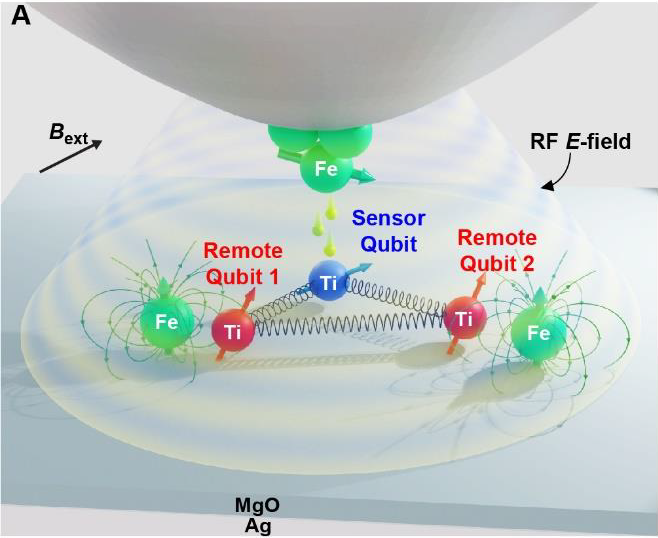주메뉴
- About IBS 연구원소개
-
Research Centers
연구단소개
- Research Outcomes
- Mathematics
- Physics
- Center for Theoretical Physics of the Universe(Particle Theory and Cosmology Group)
- Center for Theoretical Physics of the Universe(Cosmology, Gravity and Astroparticle Physics Group)
- Center for Exotic Nuclear Studies
- Center for Artificial Low Dimensional Electronic Systems
- Center for Underground Physics
- Center for Axion and Precision Physics Research
- Center for Theoretical Physics of Complex Systems
- Center for Quantum Nanoscience
- Center for Van der Waals Quantum Solids
- Chemistry
- Life Sciences
- Earth Science
- Interdisciplinary
- Center for Neuroscience Imaging Research(Neuro Technology Group)
- Center for Neuroscience Imaging Research(Cognitive and Computational Neuroscience Group)
- Center for Algorithmic and Robotized Synthesis
- Center for Genome Engineering
- Center for Nanomedicine
- Center for Biomolecular and Cellular Structure
- Center for 2D Quantum Heterostructures
- Center for Quantum Conversion Research
- Institutes
- Korea Virus Research Institute
- News Center 뉴스 센터
- Career 인재초빙
- Living in Korea IBS School-UST
- IBS School 윤리경영


주메뉴
- About IBS
-
Research Centers
- Research Outcomes
- Mathematics
- Physics
- Center for Theoretical Physics of the Universe(Particle Theory and Cosmology Group)
- Center for Theoretical Physics of the Universe(Cosmology, Gravity and Astroparticle Physics Group)
- Center for Exotic Nuclear Studies
- Center for Artificial Low Dimensional Electronic Systems
- Center for Underground Physics
- Center for Axion and Precision Physics Research
- Center for Theoretical Physics of Complex Systems
- Center for Quantum Nanoscience
- Center for Van der Waals Quantum Solids
- Chemistry
- Life Sciences
- Earth Science
- Interdisciplinary
- Center for Neuroscience Imaging Research(Neuro Technology Group)
- Center for Neuroscience Imaging Research(Cognitive and Computational Neuroscience Group)
- Center for Algorithmic and Robotized Synthesis
- Center for Genome Engineering
- Center for Nanomedicine
- Center for Biomolecular and Cellular Structure
- Center for 2D Quantum Heterostructures
- Center for Quantum Conversion Research
- Institutes
- Korea Virus Research Institute
- News Center
- Career
- Living in Korea
- IBS School
News Center
A New Qubit Platform is Created Atom by AtomSeoul, Korea - Researchers at the IBS Center for Quantum Nanoscience (QNS) at Ewha Womans University have accomplished a groundbreaking step forward in quantum information science. In partnership with teams from Japan, Spain, and the US, they created a novel electron-spin qubit platform, assembled atom-by-atom on a surface. This breakthrough was published in the journal Science on 2023/10/06. Unlike previous atomic quantum devices on surfaces where only a single qubit could be controlled, the researchers at QNS successfully demonstrated the ability to control multiple qubits simultaneously, enabling the application of single-, two-, and three-qubit gates. Qubits, the fundamental units of quantum information, are key to quantum applications such as quantum computing, sensing, and communication. PHARK Soo-hyon, one of the QNS principal investigators, highlights the significance of this project. "To date, scientists have only been able to create and control a single qubit on a surface, making this a major step forward towards multi-qubit systems," he stated. Led by BAE Yujeong, PHARK Soo-hyon, and director Andreas HEINRICH, QNS developed this novel platform, which consists of individual magnetic atoms placed on a pristine surface of a thin insulator. These atoms can be precisely positioned using the tip of a scanning tunneling microscope (STM) and manipulated with the assistance of electron spin resonance (ESR-STM). This atomic-scale control has allowed researchers to manipulate quantum states coherently. They also established the possibility of controlling remote qubits, opening the path to scaling up to tens or hundreds of qubits in a defect-free environment. BAE Yujeong pointed out, “It is truly amazing that we can now control the quantum states of multiple individual atoms on surfaces at the same time”. The atomic-scale precision of this platform allows for the remote manipulation of the atoms to perform qubit operations individually, without moving the tip of the STM. This research marks a significant departure from other qubit platforms, such as photonic devices, ion and atom traps, and superconducting devices. One of the unique benefits of this surface-based electron-spin approach is the myriad of available spin species and the vast variety of two-dimensional geometries that can be precisely assembled. Looking forward, the researchers anticipate quantum sensing, computation, and simulation protocols using these precisely assembled atomic architectures. Altogether, the work by the QNS researchers is expected to usher in a new era of atomic-scale control in quantum information science, cementing Korea’s position as a global leader in the field.
Notes for editors
- References
- Media Contact
- About the Center for Quantum Nanoscience
- About the Institute for Basic Science (IBS)
|
| Next | |
|---|---|
| before |
- Content Manager
- Public Relations Team : Yim Ji Yeob 042-878-8173
- Last Update 2023-11-28 14:20













